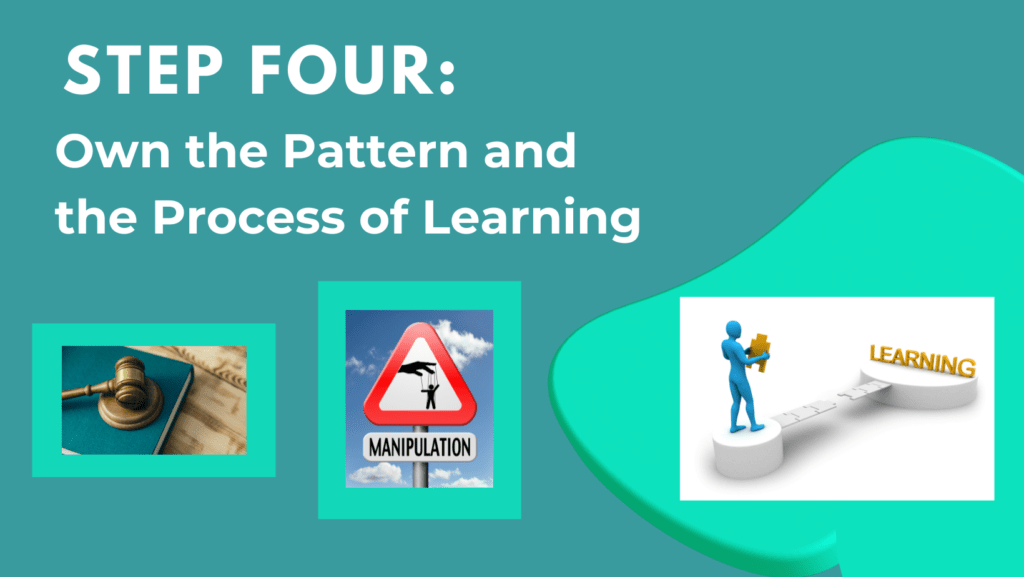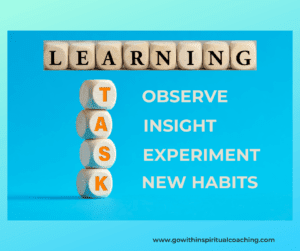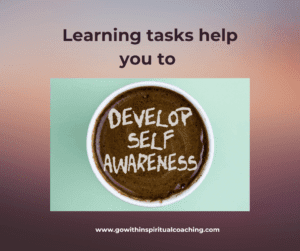
STEP FOUR: OWN THE PATTERN AND THE PROCESS OF LEARNING
To become a whole, integrated being, you must get to the root cause of any issue, block, or trauma you may have. You want to treat your entire system, not just the symptoms. In the same way, alcohol was a symptom of my disease; the real problem was me. I had to “get under my hood” and take a long hard look at the actions I took that got me to where I was—sitting in a chair in an AA meeting!
“Beneath every behavior, there is a feeling. And beneath every feeling, there is a need. 
I had to step up and take responsibility for my health and wellness. I had to own my actions and the outcomes and then learn an entirely new way to live. It wasn’t easy, but I did it.
The Necessity to be Active
If you want transformation, you must be the engine of your train and take command. A competent and honest coach will guide you through the process and encourage you to actively engage in your learning and development.
You need to comprehend and acknowledge that the patterns you created during your life are yours and yours alone. It means you made the outcomes you currently have, whether you like them or not.
You will explore your paradigms and learn you can be an active agent of change, transforming yourself. As you are helped, given the space to slow things down and learn tasks to complete, you’ll find yourself having a deeper awareness that will keep you from slipping back into old patterns.
Remember, this is your life and your journey. You’ll need to acknowledge and own your thoughts, feelings, and states of mind to change your behavior patterns.
Learning Tasks
Previously coached, you might have been assigned work to complete before the next session. In transformational coaching, these assignments are called learning tasks, which help you question and challenge what you believe to be valid to grow. Through these tasks, you’ll discover what is hidden beneath the surface. It is similar to shadow work in that you look for, own, 
Four Distinct Learning Tasks
Learning tasks are offered at various stages of your transformational coaching. The four tasks are Observe, Insight, Experiment, and New Habits. Many learning tasks are fashioned for awareness and exploration, while others are designed to help create the possibility of a breakthrough. They are designed to give you control of your transformation and to concentrate on learning what is necessary to complete it.
Observe—the first learning tasks are observational and designed to get the awareness of your pattern, not to understand it, but to see it in action. For example, if you’re uncomfortable speaking in a large group, observe your feelings before and during your talk. Where did you feel nervous? Where did you feel judged? Were you fearful you weren’t coming across well? Explore where you got off-center, and the inner critic comes in.
Insight֫—the next learning task is to provide insight to understand your paradigm—the causes—where and how it gets triggered, and what triggers it. For example, If you are controlling and micro-manage, write down the next time you have the impulse to micro-manage. What is the situation? What are your feelings and desires at that moment? Writing the answers to these questions gives you more awareness of your pattern.
Experiment—the following learning task is to experiment and try out new behaviors or approaches. For example, meet with three people with whom you are uncomfortable raising an issue. Make sure they won’t “blast” you, but you need to confront them. It would help if you wrote down your thoughts and feelings in advance of what you will say and then boldly say it.
New Habits—the last learning task is forming new habits. Once your new paradigm is clear, you need to practice it. For instance, when speaking to a large group, be aware that you are quieting the inner critic. Do mini-practices, and over time the new habit will form.
As you have searched to find the underlying pattern, these learning tasks will help you become aware of what causes them as well as help eliminate them. The learning tasks also provide the spaciousness for new paradigms to arise. The tasks are assigned at the end of the session and debriefed and the beginning of the next session.

Schedule your 1-hour complimentary coaching session now to learn more!

